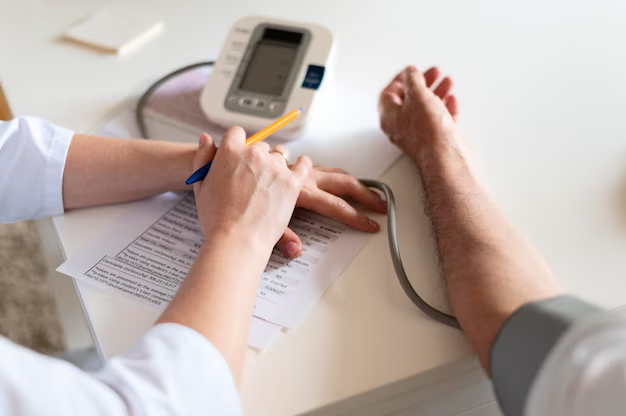Your Guide to How Is Hypertension Diagnosed
What You Get:
Free Guide
Free, helpful information about HyperTension FAQ and related How Is Hypertension Diagnosed topics.
Helpful Information
Get clear and easy-to-understand details about How Is Hypertension Diagnosed topics and resources.
Personalized Offers
Answer a few optional questions to receive offers or information related to HyperTension FAQ. The survey is optional and not required to access your free guide.
Discovering Hypertension: How Doctors Diagnose High Blood Pressure
Hypertension, commonly known as high blood pressure, is a silent but serious health condition that affects millions worldwide. Fortunately, diagnosing hypertension is straightforward and typically involves a few simple steps. Understanding this process can empower individuals to take charge of their health and seek necessary treatment early.
Why Diagnosing Hypertension Matters
Hypertension often exhibits no symptoms, earning it the title of a "silent killer." Undetected, it can lead to severe health complications like heart disease, stroke, and kidney damage. Early diagnosis is crucial for managing and mitigating these risks.
The Process of Diagnosing Hypertension
Step 1: Blood Pressure Measurement
At the core of diagnosing hypertension lies the blood pressure test. Using a sphygmomanometer, a healthcare provider measures the force of blood against your artery walls. This device consists of an inflatable cuff placed around the upper arm, connected to a gauge that records the pressure. Blood pressure is expressed in two numbers: systolic (pressure during a heartbeat) and diastolic (pressure between beats). A reading of 120/80 mmHg is considered normal, with readings consistently above 130/80 mmHg indicating hypertension.
Step 2: Repeated Measurements
To confirm hypertension, doctors typically require multiple readings over time. Blood pressure can fluctuate due to various factors, including stress, activity levels, and time of day. By assessing readings at different visits, healthcare providers ensure an accurate diagnosis.
Step 3: Monitoring at Home
Home monitoring can provide valuable insights into your daily blood pressure trends. Home blood pressure monitors are easily available and allow for consistent tracking of readings, offering a comprehensive view of your blood pressure status.
Step 4: Additional Tests
If hypertension is suspected, further tests may be advised to determine the underlying cause and assess any related health issues. These tests might include:
- Blood tests to check cholesterol and blood sugar levels.
- Electrocardiogram (ECG) to measure heart activity.
- Urinalysis to check for kidney function.
Empowering Your Health Journey
Being proactive about your health involves more than just understanding the diagnosis of hypertension. Tackling the financial aspects of healthcare can also be daunting, yet help is available. Let's transition into exploring opportunities that can ease the financial burden when managing hypertension or pursuing further education about health.
Finding Financial Aid and Educational Resources:
If you're navigating hypertension or want to learn more about managing your health, there's a wealth of resources available:
- 🌍 Government Assistance Programs: Many countries offer subsidized healthcare for those with chronic conditions like hypertension, reducing medication and doctor visit costs.
- 📘 Educational Grants: Explore scholarships and grants designed for career advancement in healthcare, allowing you to gain expert knowledge and actively manage your health.
- 💳 Credit Counseling Services: If healthcare expenses overwhelm your budget, credit counseling can guide you toward effective financial strategies and debt relief solutions.
- 🕊️ Non-profit Organizations: Numerous NGOs provide financial aid, support groups, and free educational materials for those managing chronic conditions.
Taking control of your health doesn't stop at a diagnosis. Leverage these tools to ensure both your physical and financial wellness are on the right track.
Quick Links to Resources
- ✅ Affordable Healthcare Plans: Helps make regular check-ups and medication more manageable.
- ✅ Educational Loans and Grants: Supports further learning for a deeper understanding of health management.
Empower yourself by taking advantage of these resources and focus on a holistic approach to health and financial stability. Remember, early diagnosis and proactive management can significantly improve your quality of life.
What You Get:
Free HyperTension FAQ Guide
Free, helpful information about How Is Hypertension Diagnosed and related resources.

Helpful Information
Get clear, easy-to-understand details about How Is Hypertension Diagnosed topics.

Optional Personalized Offers
Answer a few optional questions to see offers or information related to HyperTension FAQ. Participation is not required to get your free guide.


Discover More
- a 66 Year Old Female With a History Of Hypertension
- Are Eggs Bad For Hypertension
- Are Eggs Good For Hypertension
- Are Endocrine Disorders Causing Hypertension Rare
- Can Adderall Cause Hypertension
- Can Alcohol Cause Hypertension
- Can Allergies Cause Hypertension
- Can Anemci People Get Hypertension
- Can Anemia Cause Hypertension
- Can Antibiotics Cause Hypertension
